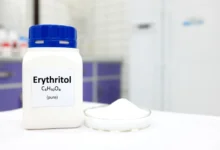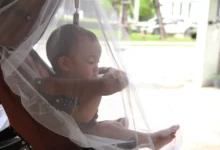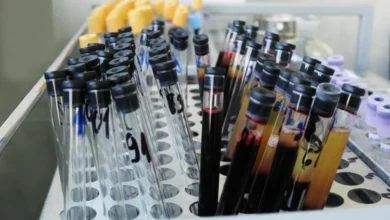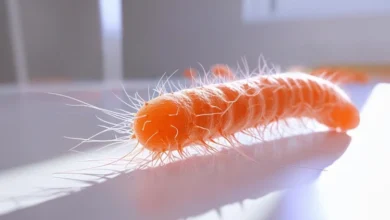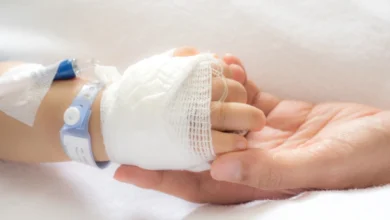China’s ‘Folded Man’ Finds New Hope After Transformative Surgery
Li Hua, once severely bent by a rare disease, regained hope and mobility after life-changing surgery in Shenzhen
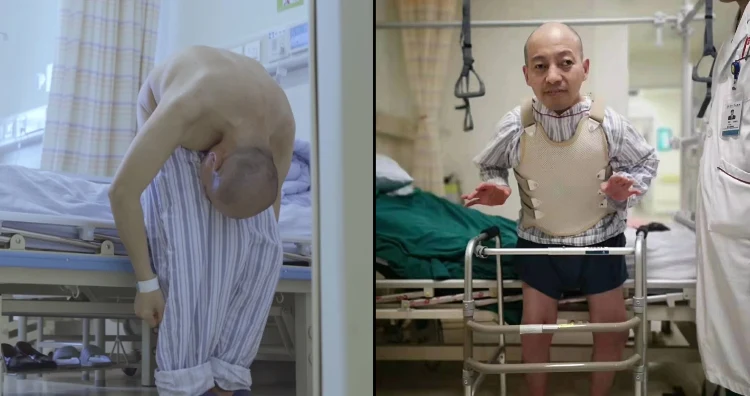
Li Hua had lived with a rare autoimmune disease for decades, leaving him with a severely curved spine that bent his upper body forward. After years of searching, he finally found a specialist in Shenzhen who could help him.
Li Hua, often called China’s ‘folded man,’ suffered from a condition that deformed his spine. This story highlights Li’s life before a team of doctors in Shenzhen performed surgery that allowed him to stand straight again.

On a peaceful autumn morning in Hunan province, 47-year-old Li sits outside his home, enjoying the sunshine. After a while, he uses a walking frame to get inside and sits by the counter, scrolling through news on his phone.
What seems like a simple routine was once impossible for Li.
Li was diagnosed with ankylosing spondylitis, an autoimmune disease, at the age of 18. The disease causes the bones to fuse, forcing the spine to curve forward. Over time, his body bent completely, with his chin touching his chest, his breastbone meeting his pubic bone, and his face resting on his thighs.

His condition worsened until he could no longer straighten his body, lift his head, or lie flat. Li depended on his mother for full-time care.
Last year, everything changed when he underwent four complex surgeries at Shenzhen University General Hospital. It was the first time such an operation had been successfully done in China.

Li now has 20 metal pins in his body and cannot move his neck. He still needs his mother’s help to lie down, get out of bed, dress, and use the toilet. However, his condition has improved dramatically.
“I can now walk slowly with a walking frame, brush my teeth, wash my face, and sit at the table to eat like everyone else,” Li said. “I’m happy – I have hope.”
Li was born in a rural town in Qiyang county. His father worked at a military factory, while his mother was a local village committee member. He grew up with two brothers.

After completing secondary school, Li planned to leave his hometown and find work, but at 18, he started feeling pain in his feet, legs, and waist. His plans were put on hold. Doctors initially diagnosed him with arthritis and prescribed painkillers and anti-inflammatories to manage his symptoms.
However, his condition worsened. By the time he was 27, his neck had become stiff, and within two years, he couldn’t lift his head. His body gradually folded forward, and by 40, his face was nearly touching his thighs.
Li used a small wooden bench and a walking stick to get around. To eat, his mother positioned a bowl close enough for him to reach. Due to his deformed digestive system, he could only manage two small meals a day. His mother also had to dress him, though it was a difficult task.

Over the years, his mother, Tang Dongchen, tirelessly sought medical help. They visited doctors in different provinces, but none could offer more than pain relief. In 2017, they went to a hospital in Chengdu, where Li finally received a diagnosis: ankylosing spondylitis. Unfortunately, the doctors said his case was too severe to operate on and sent him home.
Tang, determined not to give up, said, “I brought him into this world, so I had to do my best to help him. If I didn’t, who would care for him when I’m gone?”
Li also refused to lose hope. He continued searching for possible treatments until he found Dr. Tao Huiren, head of spinal surgery at Shenzhen University General Hospital, in June 2019. Dr. Tao agreed to help.
The surgery was risky and involved breaking and reconstructing multiple bones. After four operations and six months of rehabilitation, Li returned home in June this year.

“When Li Hua came home, the entire street came to see if it was really him standing straight again,” Tang said. “People crowded our home, saying it was like a miracle, as if the doctors had performed magic.”
Li now has a daily routine of physiotherapy. He’s resumed playing the harmonica and practicing calligraphy, two hobbies he enjoyed before his condition worsened. He also helps his parents run a small tobacco stand in their village.
Additionally, elderly villagers often come to Li for help with their mobile phones since many young people have moved to the cities for work. Some even visit him for fortune-telling.

“I’ve read a few books on fortune-telling, and I’ve helped a few neighbors,” Li said. “It’s mentally tiring, so I don’t do it too often. For myself, I calculated that last year would bring me good luck. I think that prediction came true.”



